
Renewable energy and infrastructure solutions provider Gibraltar Industries (NASDAQ:ROCK) fell short of the market’s revenue expectations in Q2 CY2025, with sales falling 12.3% year on year to $309.5 million. The company’s full-year revenue guidance of $1.18 billion at the midpoint came in 17.4% below analysts’ estimates. Its non-GAAP profit of $1.13 per share was in line with analysts’ consensus estimates.
Is now the time to buy Gibraltar? Find out by accessing our full research report, it’s free.
Gibraltar (ROCK) Q2 CY2025 Highlights:
- Revenue: $309.5 million vs analyst estimates of $377.1 million (12.3% year-on-year decline, 17.9% miss)
- Adjusted EPS: $1.13 vs analyst estimates of $1.12 (in line)
- Adjusted EBITDA: $55.06 million vs analyst estimates of $56.4 million (17.8% margin, 2.4% miss)
- The company dropped its revenue guidance for the full year to $1.18 billion at the midpoint from $1.43 billion, a 17.5% decrease
- Management lowered its full-year Adjusted EPS guidance to $4.33 at the midpoint, a 12.2% decrease
- Operating Margin: 12.8%, in line with the same quarter last year
- Free Cash Flow Margin: 8.8%, similar to the same quarter last year
- Market Capitalization: $1.9 billion
“We executed well in the second quarter with adjusted net sales up 14% and adjusted EPS up 11%, and we generated $44 million of operating cash flow as we had strong performance from our recently acquired metal roofing and structures businesses and we delivered market participation gains in building accessories,” stated Chairman and CEO Bill Bosway.
Company Overview
Gibraltar (NASDAQ:ROCK) makes renewable energy, agriculture technology and infrastructure products. Its mission statement is to make everyday living more sustainable.
Revenue Growth
A company’s long-term sales performance can indicate its overall quality. Any business can experience short-term success, but top-performing ones enjoy sustained growth for years. Over the last five years, Gibraltar grew its sales at a tepid 4.5% compounded annual growth rate. This fell short of our benchmark for the industrials sector and is a tough starting point for our analysis.
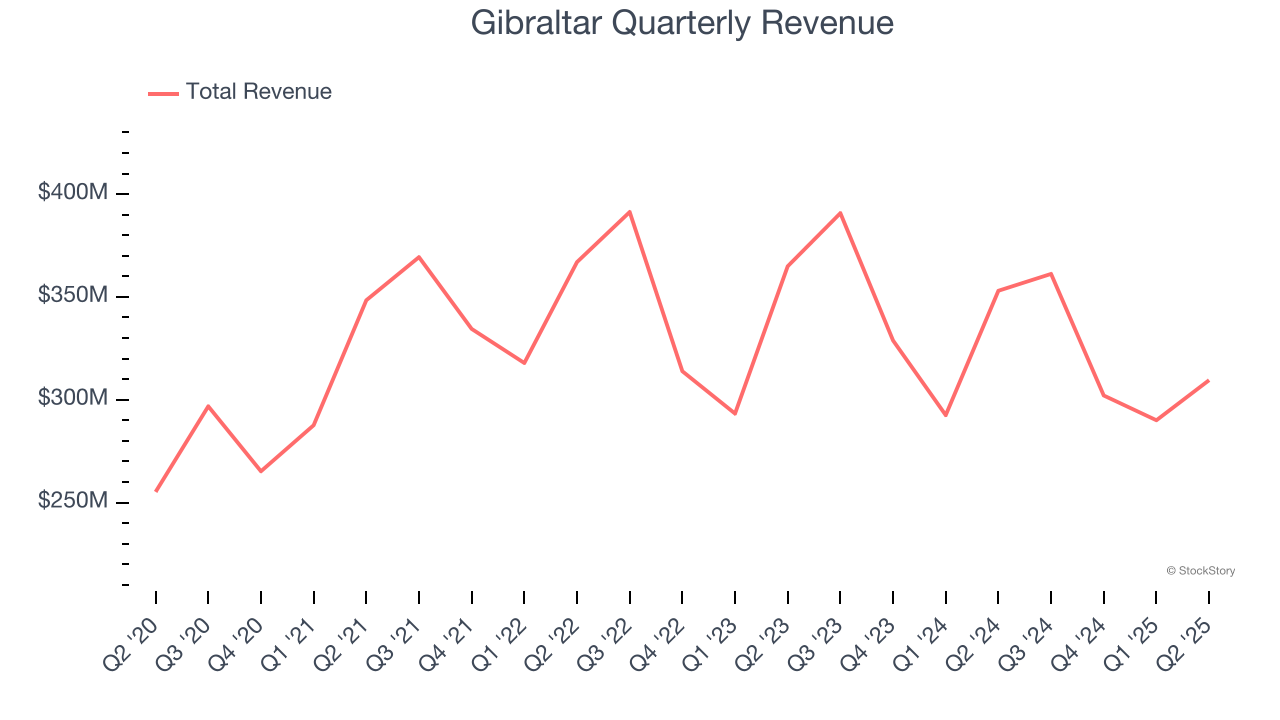
Long-term growth is the most important, but within industrials, a half-decade historical view may miss new industry trends or demand cycles. Gibraltar’s performance shows it grew in the past but relinquished its gains over the last two years, as its revenue fell by 3.8% annually. 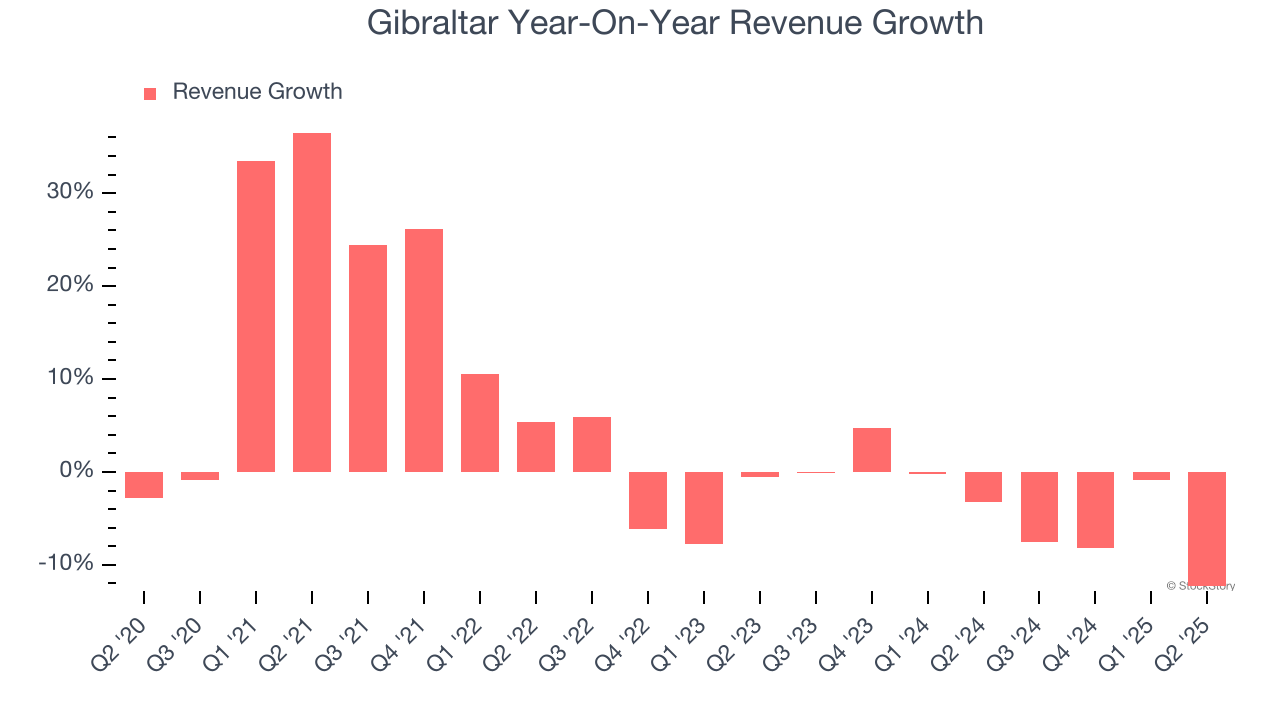
This quarter, Gibraltar missed Wall Street’s estimates and reported a rather uninspiring 12.3% year-on-year revenue decline, generating $309.5 million of revenue.
Looking ahead, sell-side analysts expect revenue to grow 18.7% over the next 12 months, an improvement versus the last two years. This projection is eye-popping and indicates its newer products and services will fuel better top-line performance.
Today’s young investors won’t have read the timeless lessons in Gorilla Game: Picking Winners In High Technology because it was written more than 20 years ago when Microsoft and Apple were first establishing their supremacy. But if we apply the same principles, then enterprise software stocks leveraging their own generative AI capabilities may well be the Gorillas of the future. So, in that spirit, we are excited to present our Special Free Report on a profitable, fast-growing enterprise software stock that is already riding the automation wave and looking to catch the generative AI next.
Operating Margin
Gibraltar has managed its cost base well over the last five years. It demonstrated solid profitability for an industrials business, producing an average operating margin of 10.9%. This result was particularly impressive because of its low gross margin, which is mostly a factor of what it sells and takes huge shifts to move meaningfully. Companies have more control over their operating margins, and it’s a show of well-managed operations if they’re high when gross margins are low.
Looking at the trend in its profitability, Gibraltar’s operating margin rose by 2.5 percentage points over the last five years, as its sales growth gave it operating leverage. Its expansion was impressive, especially when considering most Home Construction Materials peers saw their margins plummet.
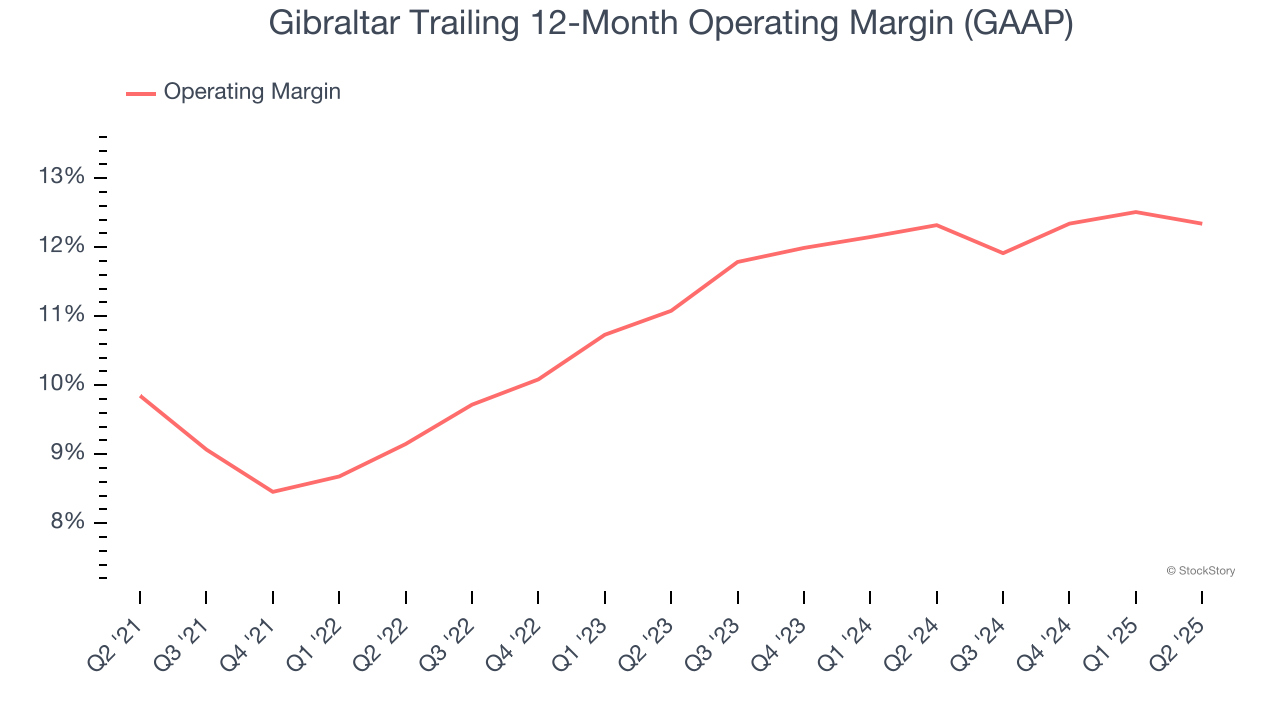
In Q2, Gibraltar generated an operating margin profit margin of 12.8%, in line with the same quarter last year. This indicates the company’s cost structure has recently been stable.
Earnings Per Share
Revenue trends explain a company’s historical growth, but the long-term change in earnings per share (EPS) points to the profitability of that growth – for example, a company could inflate its sales through excessive spending on advertising and promotions.
Gibraltar’s EPS grew at a decent 8.6% compounded annual growth rate over the last five years, higher than its 4.5% annualized revenue growth. This tells us the company became more profitable on a per-share basis as it expanded.
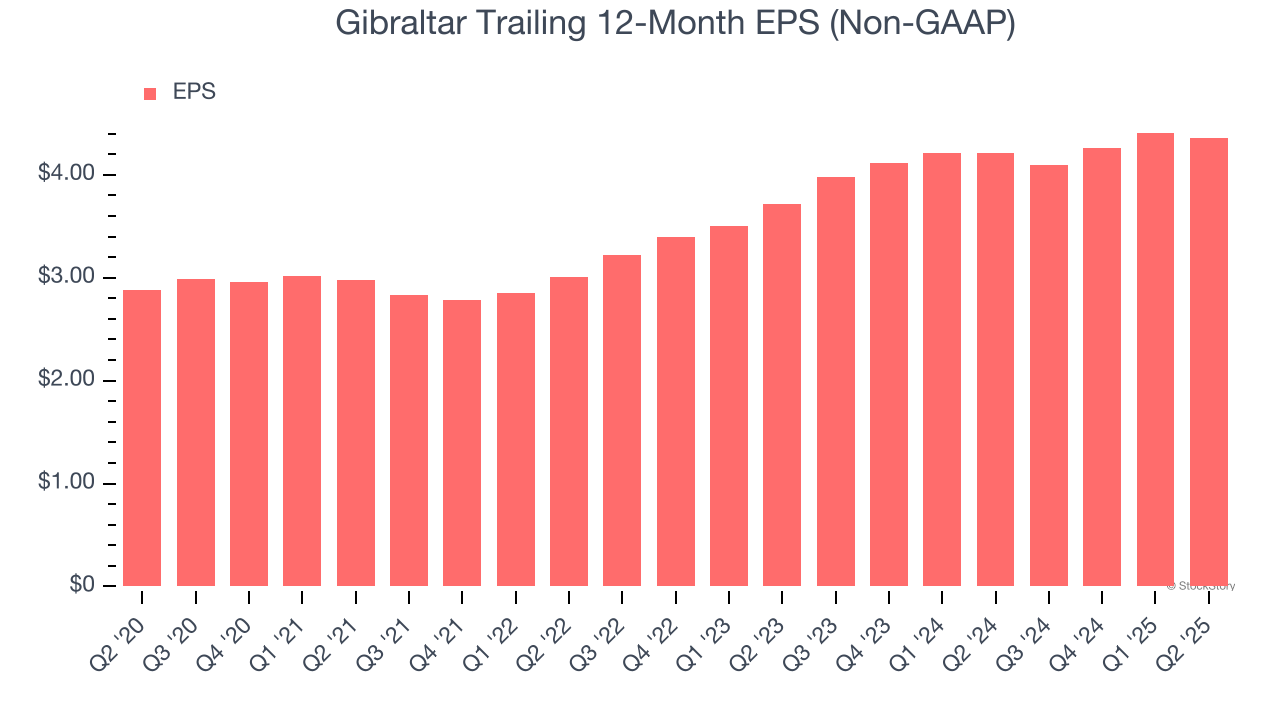
Diving into Gibraltar’s quality of earnings can give us a better understanding of its performance. As we mentioned earlier, Gibraltar’s operating margin was flat this quarter but expanded by 2.5 percentage points over the last five years. On top of that, its share count shrank by 9.3%. These are positive signs for shareholders because improving profitability and share buybacks turbocharge EPS growth relative to revenue growth. 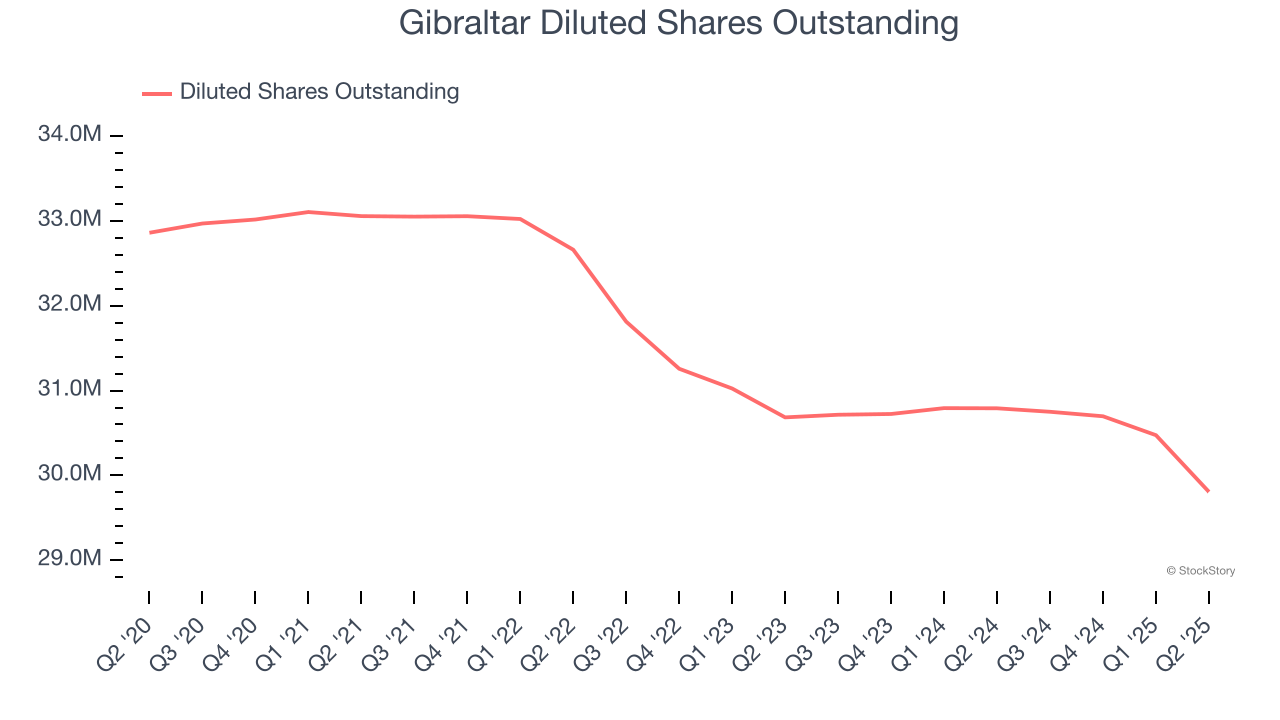
Like with revenue, we analyze EPS over a more recent period because it can provide insight into an emerging theme or development for the business.
For Gibraltar, its two-year annual EPS growth of 8.3% is similar to its five-year trend, implying stable earnings power.
In Q2, Gibraltar reported adjusted EPS at $1.13, down from $1.18 in the same quarter last year. This print was close to analysts’ estimates. Over the next 12 months, Wall Street expects Gibraltar’s full-year EPS of $4.36 to grow 14.7%.
Key Takeaways from Gibraltar’s Q2 Results
We struggled to find many positives in these results. Its full-year revenue and EPS guidance also fell short of Wall Street’s estimates. Overall, this was a weaker quarter. The stock traded down 4% to $61.75 immediately after reporting.
The latest quarter from Gibraltar’s wasn’t that good. One earnings report doesn’t define a company’s quality, though, so let’s explore whether the stock is a buy at the current price. What happened in the latest quarter matters, but not as much as longer-term business quality and valuation, when deciding whether to invest in this stock. We cover that in our actionable full research report which you can read here, it’s free.
